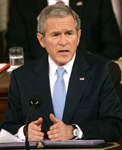Next US president faces tough challenges abroad
 Washington - US President George W Bush came into office seven years ago pledging to focus on a domestic agenda, with less interest in getting entangled abroad in the peacekeeping and "nation- building" missions that characterized the 1990s.
Washington - US President George W Bush came into office seven years ago pledging to focus on a domestic agenda, with less interest in getting entangled abroad in the peacekeeping and "nation- building" missions that characterized the 1990s.
All that changed after the terrorist attacks of September 11, 2001. Now, as Bush prepares to leave office in January, he will be handing the next president a daunting to-do list, topped by the largest ongoing deployments of US military forces in combat to be handed over from one president to the next since the Vietnam War.
Bush's successor will inherit the wars in Iraq and Afghanistan, along with the parallel efforts to prop up the elected governments of both countries - the very type of nation-building that Bush ridiculed as a candidate eight years ago.
The next president will also take the reins in the broader war on terrorism and the complex diplomacy to curb the nuclear ambitions of Iran and North Korea, while trying to overcome the unprecedented unpopularity of the United States in the world.
"There's not going to be a lot of time for on-the-job training," said John Pike, a foreign-policy analyst at GlobalSecurity. org, a think-tank outside Washington.
Experience has been the focus of the presidential campaign on foreign-policy issues. Hillary Clinton, who trails fellow Senator Barack Obama in the tight race for the Democratic nomination, has touted her eight years as first lady and seven years representing New York state in the US Senate to argue that she will be ready on "day one."
The presumptive Republican nominee, Senator John McCain, a Vietnam War POW who has built up his credentials as a leading congressional voice on foreign policy, said his background is stronger than either of the centre-left Democrats.
Obama points out that he is the only one of the three to oppose the invasion of Iraq, though he was still a state legislator in his home state of Illinois when Congress voted in
2002 to authorize the use of force against Saddam Hussein's regime.
Iraq has lately been overshadowed by the slumping US economy as the main issue of the presidential race, but it remains atop the foreign-policy debate. The two Democrats have tapped into public opposition to the war and pledged to set timeframes for troop withdrawals if they take the White House.
"Ending the war in Iraq is the first step toward restoring the United States' global leadership," Clinton said in an essay published by Foreign Affairs magazine.
Clinton, 60, and Obama, 46, want to send a clear signal to the Baghdad government that the US military presence is not indefinite, to pressure Iraqi leaders to end political infighting and more quickly take responsibility for the country.
McCain, 71, has joined Clinton and Obama in harshly criticizing Bush for mismanaging the war, but he blasts the Democrats' plans for withdrawal timelines as "irresponsible," amounting to a surrender of the "central front" in the war on terrorism to al-Qaeda.
Clinton and Obama want to refocus US military efforts on the Taliban and al-Qaeda in Afghanistan by removing forces from Iraq, but some observers believe the political rhetoric will not match the reality on the ground in Iraq if either becomes president.
"It's just going to be a question of how much of a backlash they are going to have from their (voting) base when the base finally figures out that we are going to be in Iraq for a very long time," Pike said.
All three candidates have not ruled out unilateral military action when vital US interests are at stake, but all three have also said they will emphasize the type of multilateral diplomacy that foreign critics believe was lacking during the Bush years.
"Our great power does not mean that we can do whatever we want, whenever we want," McCain said in March. "Nor should we assume we have all the wisdom and knowledge necessary to succeed."
Obama has highlighted his upbringing, in which he lived for several years in Indonesia and travelled in Pakistan, and touts his multicultural background - his father was from Kenya - as traits that provide him a better understanding of Islamic cultures and would translate into better relations with Muslim countries.
"I can speak credibly to them about the fact that I respect their culture, that I understand their religion, that I have lived in a Muslim country," Obama recently told Newsweek. "And as a consequence, I know it is possible to reconcile Islam with modernity and respect for human rights and a rejection of violence."
Obama has said he will talk directly with US foes North Korea, Iran and Cuba among other countries within his first year in office, faulting the Bush administration for rejecting dialogue.
McCain and Clinton have not ruled out engaging those regimes but have called Obama "naive" for believing that talking alone can resolve differences. Clinton has said she wants a sense of clear direction about what might be accomplished before holding such meetings.
All three candidates have pledged to ensure that Iran not be permitted to obtain nuclear weapons, with McCain sounding more prepared to use military force if diplomacy fails. Clinton and Obama have not ruled out launching an attack against the Islamic state if Iran continues down the path of developing nuclear capability. (dpa)